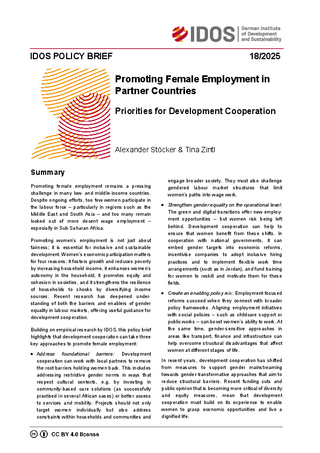Promoting female employment in partner countries: priorities for development cooperation
Stöcker, Alexander / Tina ZintlPolicy Brief (18/2025)
Bonn: German Institute of Development and Sustainability (IDOS)
DOI: https://doi.org/10.23661/ipb18.2025
Promoting female employment remains a pressing challenge in many low- and middle-income countries. Despite ongoing efforts, too few women participate in the labour force – particularly in regions such as the Middle East and South Asia – and too many remain locked out of more decent wage employment – especially in Sub-Saharan Africa.
Promoting women’s employment is not just about fairness; it is essential for inclusive and sustainable development. Women’s economic participation matters for four reasons: it fosters growth and reduces poverty by increasing household income, it enhances women’s autonomy in the household, it promotes equity and cohesion in societies, and it strengthens the resilience of households to shocks by diversifying income sources. Recent research has deepened understanding of both the barriers and enablers of gender equality in labour markets, offering useful guidance for development cooperation.
Building on empirical research by IDOS, this policy brief highlights that development cooperation can take three key approaches to promote female employment:
- Address foundational barriers: Development cooperation can work with local partners to remove the root barriers holding women back. This includes addressing restrictive gender norms in ways that respect cultural contexts, e.g. by investing in community-based care solutions (as successfully practised in several African cases) or better access to services and mobility. Projects should not only target women individually but also address constraints within households and communities and engage broader society. They must also challenge gendered labour market structures that limit women’s paths into wage work.
- Strengthen gender equality on the operational level: The green and digital transitions offer new employment opportunities – but women risk being left behind. Development cooperation can help to ensure that women benefit from these shifts. In cooperation with national governments, it can embed gender targets into economic reforms, incentivise companies to adopt inclusive hiring practices and to implement flexible work time arrangements (such as in Jordan), and fund training for women to reskill and motivate them for these fields.
- Create an enabling policy mix: Employment-focused reforms succeed when they connect with broader policy frameworks. Aligning employment initiatives with social policies – such as childcare support or public works – can boost women’s ability to work. At the same time, gender-sensitive approaches in areas like transport, finance and infrastructure can help overcome structural disadvantages that affect women at different stages of life.
In recent years, development cooperation has shifted from measures to support gender mainstreaming towards gender-transformative approaches that aim to reduce structural barriers. Recent funding cuts and public opinion that is becoming more critical of diversity and equity measures, mean that development cooperation must build on its experience to enable women to grasp economic opportunities and live a dignified life.



